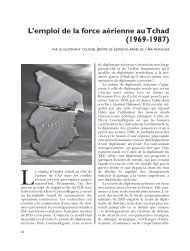78 AIR & SPACE POWER JOURNAL FALL <strong>2006</strong>weapon systems. But by using maritime strategyfor inspiration, the strategic planner canproperly understand the role of defensivestrategy, the necessity of ensuring access tospace, the need to disperse assets and systems,and the implications of making space a “barrier”to an adversary.What’s in a Name?If the term space power and its strategic contextare inadequate, then what is the properstrategic framework for considering spacewarfare? The answer to this question lies inhow our contemporary power-type strategycame about. Many military professionals readilyknow that the term space power came from asimilar application of the term airpower. 2 Thiswould seem a reasonable decision since airand space are adjoining environments andshare some of the same technical and operationalconsiderations. 3 But where did the strategiccontext of airpower come from?Many of airpower’s strategic assumptionsowe their lineage to sea power as developed bythe US Navy, which received the fundamentalprecepts of sea power from Rear Adm AlfredThayer Mahan (1840–1914), an Americannaval officer, historian, and strategist commonlyregarded as the most important analystof sea power. Particularly renowned for hiswork The Influence of Sea <strong>Power</strong> upon History,1660–1783, Mahan notes that sea power is primarilyconcerned with war at sea, shipbuilding,commercial shipping, naval bases, andtraining naval personnel. 4 To achieve its strategicends, sea power calls for fleet-on-fleetengagements against the enemy’s navy in orderto achieve a decisive victory through offensiveactions. In the end, sea power is a measureof one nation’s ability to use the seas andoceans in defiance of rivals. 5The US <strong>Air</strong> <strong>Force</strong> successfully applied apower philosophy to the strategy of air warfare.By advancing the cause of airpower asthe most efficient instrument of offensivestrategy and the preferred method of strategicdeterrence, the <strong>Air</strong> <strong>Force</strong> incorporated thesame fundamental assumptions the Navy hadused prior to and through World War II. Accordingto some historians, the <strong>Air</strong> <strong>Force</strong>’sleadership was actually more adept at advocatinga power-type strategy than the Navy’s,much to the chagrin of many naval officers ofthe time. 6 Consequently, airpower replacedsea power as the keystone of US national securitystrategy. 7As exemplified by the Navy’s experienceduring the first half of the twentieth century, apower-type strategy becomes advantageouswhen a country attempts to establish dominanceamong the international community.Nevertheless, once a nation does so in a specifiedwarfare area, such a strategy provideslittle insight into solving the most pressing futuresecurity issues. Although the Navy stillholds Mahan in high esteem, his ideas and seapower strategy have minimal applicability inpresent US maritime strategy. 8Differing from classical sea power strategy,which seeks a decisive fleet-on-fleet battle, theNavy’s present maritime strategy embraces theinterrelationship between the land and sea.Because the maritime domain includes theseas and oceans of the world, along with theland adjacent to them, maritime strategy affectsa nation’s diplomatic, information, military,and economic instruments of power.Hence, a sound maritime strategy mustbroadly consider the role of conducting internationalpolitics and leadership; promotingeconomic prosperity; ensuring freedom ofnavigation; protecting against hostile, terrorist,and criminal acts; promoting peace andsecurity; establishing forward presence; andprojecting power. 9 Sea power strategy, therefore,is but a subset of maritime strategy.Remarkably, the maritime considerationslisted above are strikingly similar to the diplomatic,information, military, and economicnational interests related to space. Since maritimeand space activities have similar strategicinterests, along with the fact that both mediumsencompass distant “bases” or hubs of operationsseparated along distant lines of communication(LOC), they will share similarstrategies. 10 Therefore, instead of a power-typestrategy owing its lineage to Mahan’s sea powerstrategy, space strategy would be better served
SPACE POWER 79by using a more encompassing maritime strategyas a strategic springboard for considering thecomplex interactions of space warfare.Corbett’s Maritime StrategyOne finds the best maritime strategicframework for considering space strategy inthe writings of Sir Julian Stafford Corbett(1854–1922), a British theorist and strategistconsidered by many historians as Great Britain’sgreatest maritime strategist. He is renownedfor his work Some Principles of MaritimeStrategy, published in 1911, which received acclaimfor its “fusion of history and strategy” indescribing the strategic principles of the maritimedomain. 11 Even though Corbett writes onmany of the same issues as Mahan, Corbettmore accurately details the intricacies of maritimestrategy since he addresses those areasindirectly affected by naval operations, such asdiplomatic and economic concerns.According to Corbett, the sea has inherentvalue as a means of communication. 12 Becauseof this, naval warfare seeks to ensure one’s accessto and use of sea lines of communication(SLOC) while denying the same to the enemy.One who can successfully do so enjoys all thebenefits of operating upon and from the seaand has “command of the sea.” 13 By establishingsuch command, a maritime nation canmove freely along SLOCs while minimizingthe risk coming from an enemy’s attacks alongthem. The vital necessity of ensuring one’s accessto and use of LOCs places primary importanceupon naval vessels that directly supportthis mission; vessels that do not serve this function—includingthe battleship—are of secondaryimportance.Corbett describes how navies can affect thebalance of power between competing nations.By building a superior naval fleet and achievingcommand of the sea, a nation garnersmore diplomatic, military, and economicpower than nations without a strong navy. Indoing so, a maritime nation can better protectits worldwide interests and remain capable ofinterfering with an adversary’s seaborne commerceand trade. Even minor actions canachieve modest diplomatic and economic resultsbecause such efforts against an adversary’seconomic trade routes or fleet can affect thebalance of wealth and power between rivals. 14Since a maritime nation extensively uses itsSLOCs for trade and commerce, it must protectand defend those lines considered mostvital. To do this, Corbett argues that navalforces must disperse along expansive LOCsyet be able to concentrate overwhelming forcerapidly when needed. 15 No matter how mucha war plan calls for the close concentration ofnaval forces, protection of commerce andtrade along SLOCs necessitates the dispersalof forces. Thus, a sound maritime strategyplaces concentration in tension with dispersalat all times. 16 Corbett writes, “Such is concentrationreasonably understood—not huddledtogether like a drove of sheep, but distributedwith a regard to a common purpose, andlinked together by the effectual energy of asingle will.” 17One finds Corbett’s most controversial departurefrom Mahan’s sea power thought inhis belief that defensive strategy is just as necessaryas offensive strategy. Like the Prussianmilitary theorist Carl von Clausewitz (1780–1831), Corbett views offensive strategy as themore “effective” form of war and defensivestrategy as the “stronger” form—both ofthem integral parts of any overarching militarystrategy. 18 Because the defense is thestronger form of warfare, a defensive strategyenables inferior naval forces to achieve notableresults, especially when one considersthat if those forces undertook offensive operationsagainst a superior foe, they wouldlikely be destroyed. Defensive strategy comesinto play when political objectives necessitatepreventing the enemy from acquiring somethingor achieving a political objective. 19 Furthermore,defensive strategy involves an attitudeof alert expectation that awaits themoment when the enemy exposes himself,making possible a successful counterattack. 20Despite the many advantages of this approach,Corbett was concerned that most naval officersof his day had exalted offensive strategyand actions at the expense of implementinga sound defensive strategy.
- Page 2 and 3:
Chief of Staff, US Air ForceGen T.
- Page 4 and 5:
PIREPsJoint Airspace Management and
- Page 6 and 7:
APJInterdependenceKey to Our Common
- Page 8 and 9:
6 AIR & SPACE POWER JOURNAL FALL 20
- Page 10 and 11:
APJLT COL PAUL D. B ERG , USAF, CHI
- Page 12 and 13:
10 AIR & SPACE POWER JOURNAL FALL 2
- Page 14 and 15:
ASPJLT COL PAUL D. B ERG , USAF, CH
- Page 16 and 17:
True to form, the Air Force has res
- Page 18 and 19:
Red Flag Still Matters—After AllT
- Page 20 and 21:
Integration of Space-BasedCombat Sy
- Page 22 and 23:
est alternative. In other cases, un
- Page 25 and 26:
power projection, but advances in a
- Page 27 and 28:
3. Report of the Commission to Asse
- Page 29 and 30: PIREP 27ized, programmed, funded, a
- Page 31 and 32: PIREP 29creation of ACMs. One antic
- Page 33 and 34: PIREP 31Link 16 and Joint Airspace
- Page 35 and 36: PIREP 33Missile Defense Systems, th
- Page 37 and 38: CADRE’s Professional EducationOpp
- Page 39 and 40: ASPJQuick-LookThe Air Force Needs N
- Page 41 and 42: QUICK-LOOK 39system should become a
- Page 43 and 44: APJThe Air Force’s New Ground War
- Page 45 and 46: THE AIR FORCE’S NEW GROUND WAR 43
- Page 47 and 48: THE AIR FORCE’S NEW GROUND WAR 45
- Page 49 and 50: THE AIR FORCE’S NEW GROUND WAR 47
- Page 51 and 52: THE AIR FORCE’S NEW GROUND WAR 49
- Page 53 and 54: THE AIR FORCE’S NEW GROUND WAR 51
- Page 55 and 56: New USAF Doctrine PublicationAir Fo
- Page 57 and 58: Counterinsurgency AirpowerAir-Groun
- Page 59 and 60: COUNTERINSURGENCY AIRPOWER 57ticula
- Page 61 and 62: COUNTERINSURGENCY AIRPOWER 59and Ai
- Page 63 and 64: COUNTERINSURGENCY AIRPOWER 61The af
- Page 65 and 66: COUNTERINSURGENCY AIRPOWER 63squadr
- Page 67 and 68: ASPJQuick-LookA New Operational Ass
- Page 69 and 70: QUICK-LOOK 67den on the OAT. First,
- Page 71 and 72: Filling the Stealth Gap and Enhanci
- Page 73 and 74: FILLING THE STEALTH GAP 71Each of t
- Page 75 and 76: FILLING THE STEALTH GAP 73the US wa
- Page 77 and 78: FILLING THE STEALTH GAP 75mit the F
- Page 79: Space PowerAn Ill-Suited SpaceStrat
- Page 83 and 84: SPACE POWER 81role of offensive and
- Page 85 and 86: SPACE POWER 83achieve supremacy in
- Page 87 and 88: Military TransformationEnds,Ways, a
- Page 89 and 90: MILITARY TRANSFORMATION 87to organi
- Page 91 and 92: MILITARY TRANSFORMATION 89course, w
- Page 93 and 94: MILITARY TRANSFORMATION 91mind-set
- Page 95 and 96: MILITARY TRANSFORMATION 93sponding
- Page 97 and 98: NOTAM 95The document’s authors ha
- Page 99 and 100: MOLECULAR NANOTECHNOLOGY AND NATION
- Page 101 and 102: MOLECULAR NANOTECHNOLOGY AND NATION
- Page 103 and 104: MOLECULAR NANOTECHNOLOGY AND NATION
- Page 105 and 106: MOLECULAR NANOTECHNOLOGY AND NATION
- Page 107 and 108: MOLECULAR NANOTECHNOLOGY AND NATION
- Page 109 and 110: ASPJQuick-LookThe Nature of Close A
- Page 111 and 112: QUICK-LOOK 109CAS missions. The pub
- Page 113 and 114: Clausewitz and the Falkland Islands
- Page 115 and 116: CLAUSEWITZ AND THE FALKLAND ISLANDS
- Page 117 and 118: CLAUSEWITZ AND THE FALKLAND ISLANDS
- Page 119 and 120: CLAUSEWITZ AND THE FALKLAND ISLANDS
- Page 121 and 122: CLAUSEWITZ AND THE FALKLAND ISLANDS
- Page 123 and 124: BOOK REVIEWS 121whose contributions
- Page 125 and 126: BOOK REVIEWS 123Franco: Soldier, Co
- Page 127 and 128: APJAir and Space Power Journal, the
- Page 129 and 130: CONTRIBUTORS 127Col Howard D. “Da
- Page 131:
EDITORIAL ADVISORY BOARDGen John A.
















